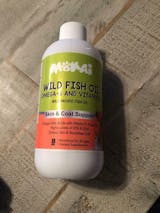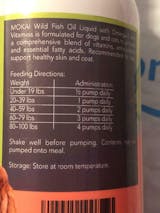Controversy about palm oil as an ingredient of many pet treats and supplements has been rising. Is palm oil bad for dogs? Does it have health benefits? And is it damaging our planet?
We are going to thoroughly answer all of these questions. But in order to calm your anxiety and to not make you wait till the end of this article to know the truth, let’s answer one of the most pressing questions: will palm oil harm my dog?
The palm oil that’s found on your dog’s supplements is not going to make immediate and permanent damage on them, so don’t rush them to the vet. But read this blog to make an informed decision on whether you still want your pet products to contain palm oil or not.
Now, let’s dive into it.
What is palm oil?
Palm oil is an edible vegetable oil that can be found on the fruit of oil palm trees. It is known for the multiple purposes it has: it is used for cooking, in food products and cosmetics. The World Wildlife Fund claims that “50% of the packaged products we find in supermarkets contain palm oil”.
But what brings us here today is the palm oil used in pet food and supplements. It has become extremely common to find it listed as one of the ingredients of products such as allergy relief chews, joint mobility treats and multivitamins.
What kind of palm oil is bad for dogs?
Palm oil, alongside other vegetable oils, can be legally released into the sea by ships, according to the regulation established by the laws Marpol Annex II and IBC Code set by the International Maritime Organization.
In some cases, this discharged palm oil ends up on the shore of a beach in a semi-solid form that resembles a rock, but can have a yellowish color. The problem with these “palm oil bergs”, as Bjorn Stignor, the Managing Director of Golden-Agri Maritime, calls them, is that they absorb toxic material such as diesel from seawater and are contaminated by bacteria and waste.

When these toxic lumps wash up to the shore, as the BBC once reported, some unfortunate dogs eat these chunks out of curiosity, and can suffer from terrible effects, such as:
- Laxative effect
- Sickness
- Diarrhea
- Dehydration
- Pancreatitis
- Blockages
One study examined the effects these palm oil bergs had on 60 dogs. They discovered that one pup developed pneumonia and another one had significant gastrointestinal signs and elevated liver enzymes.
Some of the other symptoms they discovered were vomiting, diarrhea, hypersalivation, lethargy/dullness, cough, belching and inappetence.
Luckily, all of the dogs recovered and none of the intoxications were fatal, despite the serious health issues they experienced.
Is palm oil found in pet supplements bad for dogs?
For now, there hasn’t been any studies done that evaluate the effect pure palm oil found on pet supplements can have on dogs. But, it is known that it acts primarily as a filler.
Although many pet companies claim that palm oil can have health benefits for dogs, it is something that has yet to be proved.
What has been done is research on the negative effects palm oil can have on people. Healthline has put together a list of the many studies that prove this fact, and some of the health risks palm oil can have on humans include the growth of certain heart disease risk factors.

The environmental impact of palm oil
Health concerns are not the only problem with palm oil as it has serious atrocious effects on our planet. Palm oil production is the leading cause of orangutan extinction and a major driver of deforestation of some of the world’s most biodiverse forests.
In order to produce it, our environment is permanently harmed. Some of the consequences the palm oil industry provoques are:
- Loss of biodiversity such as orangutans, rhinos, and tigers.
- Pollution
- Deforestation
- Contributing to climate change and global warming
That’s just one of the reasons why at Mokai, we choose to make dog supplements that are 100% free of any form of palm oil.
The problem with certificacions
Many pet companies include palm oil in their ingredients and they have the certificate of the “Roundtable on Sustainable Palm Oil” (RSPO) on them.
But what’s the truth behind this certificate?
The thing is that when consumers see a “sustainable” certificate, they, logically, and instantly assume that the palm oil being produced is 100% eco-friendly. Which in most cases, is not true.

A study conducted in 2020 found that most of the currently certified grower supply bases and concessions in Indonesia and Malaysia are located in biodiverse tropical forests and large habitats where mammals were less than 30 years ago.
The RSPO defines four categories behind their sustainable palm oil certificate:
- Identity preserved: guaranteed to be from one identifiable source, this way it is not unsustainable like the rest of the supply chain.
- Segregated: it just holds one difference with the previous category, it uses palm oil that comes from various certified mills and supply bases.
- Mass balance: traceable palm oil is mixed with ordinary one. Some organizations don’t consider this as sustainable palm oil.
- GreenPalm: it consists of buying the certificate, which supposedly supports the production of traceable palm oil.
Organizations such as RSPO are a key component on our journey to a more sustainable world. These different kinds of certificates are offered for companies to start doing at least something to achieve that goal. We just have to make sure companies are not using this certificate to tell their audience, and concerned pet parents, that they are a good option for palm oil, when they may not be.
















